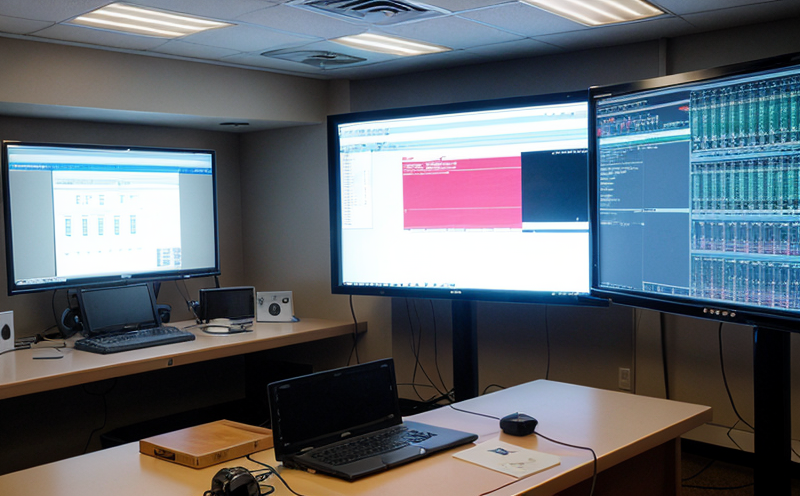IEC 62290-2 Testing of Urban Rail Control Systems (CBTC)
The IEC 62290-2 standard is a critical framework for testing and certifying urban rail control systems, particularly those employing Communications-Based Train Control (CBTC) technology. This standard ensures the reliability, safety, and interoperability of advanced railway signaling and control systems, which are essential in modern metropolitan transport networks.
The CBTC system operates on a wireless data network that allows trains to communicate with each other and the central control center in real-time. This communication enables precise tracking of train locations, speeds, and routes, improving overall traffic management and safety. The testing procedures outlined in IEC 62290-2 are designed to validate the robustness and performance of these systems under various operating conditions.
The standard covers a wide range of tests that ensure compliance with international best practices for railway signaling systems. These include functional tests, interoperability checks, and safety assessments. Functional tests verify that each component of the system operates as expected, while interoperability checks ensure seamless communication between different train control systems. Safety assessments are crucial to identify potential hazards and mitigate risks in real-world scenarios.
Implementing IEC 62290-2 testing requires a comprehensive approach involving multiple stages. The initial stage involves detailed planning and preparation of the test environment, which includes setting up simulators for train behavior and control systems. This setup allows for controlled testing under various conditions, including peak traffic periods and adverse weather conditions.
The next step is specimen preparation. For this service, specimens are typically mock-ups or replicas of real railway signaling components that mimic actual operational parameters. These specimens are subjected to a series of tests designed to simulate real-world stressors such as signal interference, power fluctuations, and environmental factors.
Instrumentation plays a crucial role in IEC 62290-2 testing. High-precision measurement tools and data logging systems are used to monitor critical parameters during the test runs. This includes voltage levels, current consumption, signal strength, and response times of all components involved. The collected data is then analyzed to ensure compliance with both IEC standards and any additional regulatory requirements.
Reporting is another vital aspect of this service. Comprehensive reports are generated detailing each test performed and the results obtained. These reports include detailed descriptions of the test setup, parameters tested, methods used, and findings observed. Compliance with IEC 62290-2 ensures that the railway control systems meet stringent quality and safety standards, thus enhancing public confidence in urban rail transport.
In conclusion, compliance with the IEC 62290-2 standard is essential for ensuring the safe and efficient operation of urban rail signaling and control systems. This service provides a robust framework for testing these critical components, ensuring they meet international best practices and regulatory requirements. By adhering to this standard, railway operators can enhance system reliability, reduce maintenance costs, and improve overall safety.
- Comprehensive planning and preparation
- Specimen preparation using mock-ups
- Utilization of high-precision instrumentation
- Data collection and analysis
- Generation of detailed compliance reports
Why It Matters
The safety and efficiency of urban rail transport are paramount, especially in densely populated areas. IEC 62290-2 testing ensures that the signaling and control systems used meet stringent international standards, thereby enhancing reliability and reducing risks associated with train operations. This testing is crucial for maintaining public confidence in railway services and ensuring compliance with regulatory requirements.
By adhering to this standard, railway operators can identify and address potential issues before they lead to operational disruptions or safety hazards. The detailed testing process helps in optimizing system performance, improving traffic management, and reducing maintenance downtime. This not only benefits the operator but also contributes positively to urban mobility and sustainability goals.
The interoperability aspect of IEC 62290-2 is particularly important for modern railway networks that often involve multiple operators or systems working together in a single metropolitan area. Ensuring seamless communication between these systems enhances overall network efficiency, reduces bottlenecks, and improves passenger experience. This standard thus plays a vital role in the continuous improvement of urban rail infrastructure.
Eurolab Advantages
At Eurolab, we pride ourselves on delivering top-tier testing services that meet international standards. Our expertise in railway signaling and control systems allows us to provide comprehensive IEC 62290-2 testing that is both efficient and accurate.
- State-of-the-art facilities: We have the latest equipment and technology required for thorough testing of railway systems.
- Experienced professionals: Our team comprises highly skilled engineers with extensive experience in urban rail control systems.
- Comprehensive services: From initial planning to final report generation, we offer a full suite of testing solutions tailored to your specific needs.
- Regulatory compliance: We ensure all tests are conducted in strict adherence to international standards such as IEC 62290-2 and other relevant regulations.
- Prompt turnaround times: Our efficient processes allow for timely completion of testing, minimizing disruptions to your operations.
- Client satisfaction: We prioritize customer service and ensure that all stakeholders are kept informed throughout the testing process.
Our commitment to excellence in railway signaling and control systems testing is reflected in our consistently high-quality services. Trust Eurolab for reliable, accurate, and efficient IEC 62290-2 testing that meets your stringent requirements.





